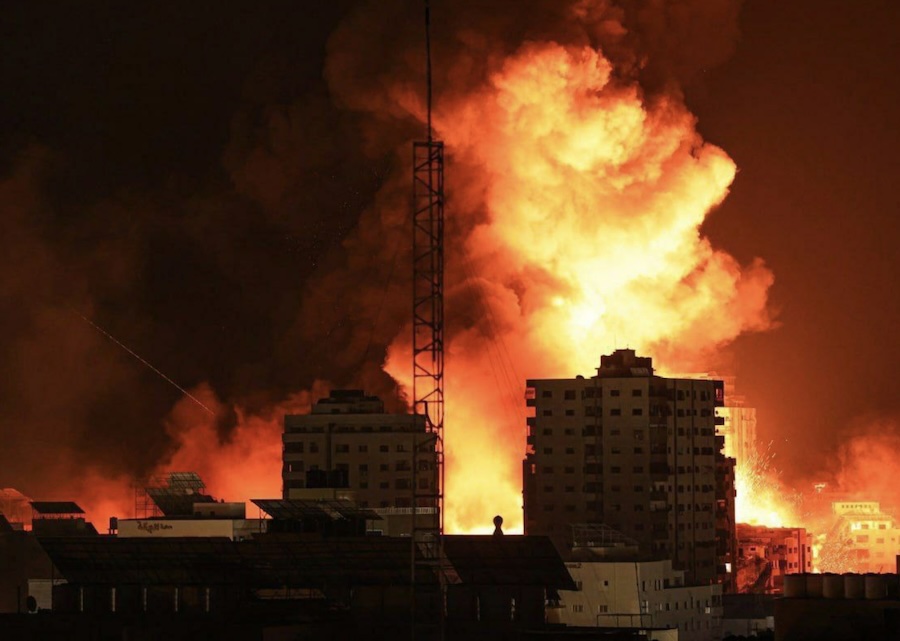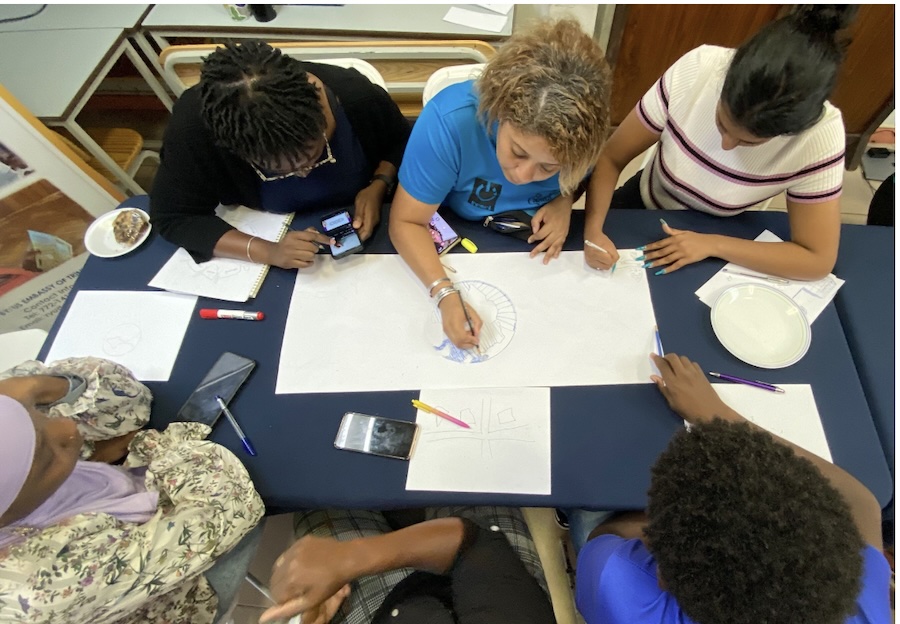DISARMAMENT & SECURITY .
A speech published by War is a Crime (the version here is abbreviated. The original speech that you may read by following this link is more than twice as long, as it also contains the arguments used to justify war preparations and a detailed critique of NATO.)
Remarks by David Swanson upon acceptance of Real Nobel Peace Prize, Oslo, Norway, November 10, 2024.
It’s wonderful to be here with many of you whose work I’ve known but whom I’ve rarely if ever been with in person. I am very grateful to John Jones and Tomas Magnusson for arranging this event. I am thrilled to be here at the start of what I expect will be years of terrific work by the Lay Down Your Arms Foundation — an appropriate name here in the House of Literature. The great [Fredrik Heffermehl, who has been gone from us for nearly a year now, often stressed the influence on Alfred Nobel in the creation of the Nobel Peace Prize by Bertha von Suttner, the author of the 1889 novel Lay Down Your Arms.

The impact of that book was not, I think, due to the characters or the plot or any depiction of how horrific war can be, but rather to the way the book framed war abolition within a story of advancing civilization. . .
.
In 1889, war itself was being civilized. The Red Cross was seeking to tend the wounded. Atrocities were being banned. Disputes among royals were being mocked by republicans as proper grounds for wars. Arbitration was proving itself as an alternative to slaughter. With slavery and pillage being left behind, with religion beginning to fade, with the technology of weaponry rapidly advancing, war was losing its economic motive, its theocratic justification, and its suitability as a test of individual skill or courage. The ending of war was an idea that went from fringe craziness to mainstream popularity during Bertha von Suttner’s lifetime, and in great measure because of her.
And here we are, well over a century later, with many forms of violence fading fast. . . . And yet, war is on the rise, the risk of nuclear war is on the rise, and the weapons business through which a small number of countries fuel war around the world has lost all shame, replacing it with the pride of performing a laudable public service. Worst of all, the vision of successful war abolition has been set aside by a too easily discouraged public. In the words of Fredrik Heffermehl, “the main obstacle to global peace is the common belief that it is impossible.” . . .
In fact, nothing ever justifies war, and nothing ever justifies preparing for war. Even if we imagine a war that has never been, a necessary and noble war that does more good than harm, that protects against subhuman monsters, that does not slaughter the innocent for the gleam in a politician’s eye . . . even if we imagine such a war, the fact will remain that keeping around the bases, weapons, ships, and personnel that make war possible does more harm than war itself — and will until war goes nuclear. The institution of war wastes money that could save many more lives than are lost in wars. War preparation, like war, is a major destroyer of the environment, and the chief impediment to international cooperation on the environment, on disease, on poverty, on homelessness. War is, of course, the chief cause of homelessness. War preparation is the justification for government secrecy and surveillance. It is a major source of bigotry and hatred, and the biggest influence in our culture in favor of continued violence. It concentrates wealth, corrupts politicians, erodes liberties, and celebrates sadism.
Fredrik Heffermehl understood the need to abolish the entire institution of war. I think he would probably have cheered for this year’s Nobel Peace Prize recipients and considered them the first such recipients in at least six years to have merited the award based on the purpose for which it was created. Abolishing nuclear weapons is essential to our survival. But when some nations maintain nuclear weapons as a misguided response to the dominance of another nation in non-nuclear warmaking, we are faced with the need to abolish the entire war enterprise if we are going to abolish its worst weapons.
(Article continued in right column)
How can the peace movement become stronger and more effective?
The Nobel Peace Prize: Does it go to the right people?
(Article continued from left column)
Reforming war isn’t going to work. Taboos on certain weapons aren’t going to hold. Restrictions on war’s cruelty are not going to be honored. During each war in recent years, we have heard the cries of the outraged: “This is not a war, it’s a genocide!” “This is not a war, it’s an occupation!” “This is not a war, it’s terrorism!” “This is not a war, it’s a crime!” And so forth. All perpetuating the myth that there ever has been or can be a war that isn’t cruel, that doesn’t terrorize, that kills only the proper people for killing. The desire to reform war has always been a noble one, but survival requires that we End it, Not Mend It. . .
What can we do to move the world in that direction?
Some of us try, as Fredrik Heffermehl did so well, to nudge the world along through books, as well as articles and speeches. I work for two organizations — RootsAction.org and World BEYOND War that, like many others, have an impact through online actions, organizing, and webinars. At World BEYOND War we also create in-depth online courses that provide an education often missing in schools. And we work with universities and schools to change that.
Most importantly, we organize local chapters with volunteer organizers who get assistance from our paid staff. World BEYOND War chapters hold meetings, book clubs, rallies, demonstrations, protests. They pass resolutions through local governments. They persuade institutions to divest from weapons profits. They put peace messages into local media. They oppose new and existing military bases.
On the World BEYOND War website we’ve created a tool that lets you spin a globe and zoom in on any of 917 U.S. military bases outside of the United States. We need your help with making sure we’ve got all the new ones. But we’re also taking them off when they’re closed, and never adding them when they’re planned but those plans are stymied. We’ve helped people in Montenegro prevent a major new NATO base from being built. People in the Czech Republic have kept a U.S. base out of their country. In Colombia, activists have blocked base construction on one island and are now protecting another. In Italy, activism failed to prevent a new base but kept it to a smaller size than planned. People have gotten bases out of Puerto Rico, the Philippines, Ecuador. The president of Ecuador told the United States that it could keep a base in Ecuador if Ecuador could have a base in the United States. Now there’s a new president who wants to bring U.S. bases back, so the struggle never ends. But can you imagine the Norwegian government demanding a Norwegian military base in Wisconsin in exchange for the U.S. having bases here? I certainly cannot imagine the U.S. government allowing it.
The lesson I draw from having worked to oppose bases in several countries while based in the Washington, D.C., area or not too far from it, is that we are stronger when we have solidarity across borders, and in particular when we are working together both at the location of a base or a proposed base and at the location of the heart of the empire in Washington. A number of times now I have worked with opponents of U.S. bases in distant corners of the globe and watched as they were asked the inevitable question by U.S. Congress members or staffers, namely: “Well, if you don’t want the base there, then where do you want it?” And in each case, to their everlasting credit and praise, these good people have responded “We do not want it anywhere.”
That kind of principled opposition should be coordinated globally. We should have days of protest at U.S. bases across Scandinavia, together with protests delivering the same message in Washington, D.C. We should put our organizers, but also our writers and video producers and photographers, artists and song writers to work building a movement to get the bases out. But not because war will be better without a particular base, rather because closing a particular base can move us a bit closer to the total abolition of war.
That’s what we need to recover from the days of Bertha von Suttner, the vision of success ahead. That we’ve had more wars, that we’ve seen more years go by, is really not relevant. This is now a matter of survival. We desperately need to turn our attention to non-optional crises instead of these ginned up festivals of the lowest depravity that Russia calls special military operations and the U.S. calls overseas contingency operations or Israel’s right to defend itself, but the rest of us call war. No more now than in 1889 is there anything in our genes or the laws of physics requiring war. There is just something in our culture that says the most useful thing you can do, as done in virtually all Hollywood movies, is to pick up a weapon. We need a culture in which the most admirable and courageous thing you can do is to Lay Down Your Arms. Let’s work on getting there.
– – – – – –
If you wish to make a comment on this article, you may write to coordinator@cpnn-world.org with the title “Comment on (name of article)” and we will put your comment on line. Because of the flood of spam, we have discontinued the direct application of comments.








